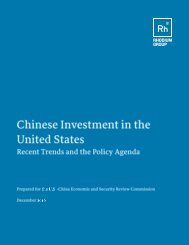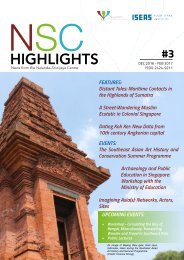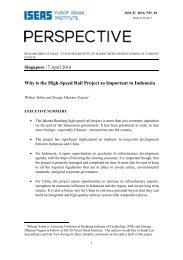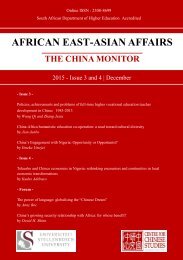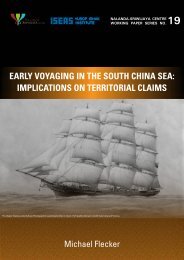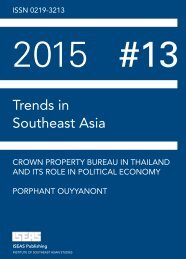Create successful ePaper yourself
Turn your PDF publications into a flip-book with our unique Google optimized e-Paper software.
MCP and <strong>the</strong> so-called “Com<strong>in</strong>tern apparatus” <strong>in</strong> Shanghai were allegedly severed with <strong>the</strong><br />
dissolution of this apparatus <strong>in</strong> mid-1935, no fur<strong>the</strong>r ties between Moscow and <strong>the</strong> <strong>Malayan</strong>s are<br />
reported (even by <strong>Malayan</strong> police officials, who are normally eager to claim <strong>the</strong>m)”. 4<br />
It apparently does not mean that <strong>the</strong> SB could not detect letters, but <strong>in</strong> <strong>the</strong> first place <strong>the</strong><br />
Com<strong>in</strong>tern did not send letters after 1936. Kurihara’s observation (see Chapter VI) endorses this<br />
situation.<br />
On <strong>the</strong> contrary, <strong>the</strong> MCP cont<strong>in</strong>ued send<strong>in</strong>g letters until April 1940. <strong>The</strong>se letters sent<br />
between 1939 and 1940 were not <strong>in</strong>tercepted by <strong>the</strong> SB.<br />
7. After <strong>the</strong> outbreak of <strong>the</strong> S<strong>in</strong>o-Japanese War <strong>in</strong> 1937, <strong>the</strong> MCP laid emph<strong>as</strong>is on <strong>the</strong> anti-<br />
Japanese national (“national” mean<strong>in</strong>g Ch<strong>in</strong>a) salvation movement and succeeded <strong>in</strong> expand<strong>in</strong>g <strong>the</strong><br />
<strong>Party</strong>’s <strong>in</strong>fluence among <strong>the</strong> Ch<strong>in</strong>ese <strong>in</strong> Malaya. S<strong>in</strong>ce <strong>the</strong> Com<strong>in</strong>tern had, until <strong>the</strong> German- USSR<br />
War, all along directed <strong>the</strong> CPs of <strong>the</strong> colonized countries to <strong>in</strong>tensify its anti-Imperialist struggle,<br />
<strong>the</strong> “Reviewers” of <strong>the</strong> Com<strong>in</strong>tern criticized <strong>the</strong> MCP for ignor<strong>in</strong>g <strong>the</strong> concrete, practical <strong>Malayan</strong><br />
situation while be<strong>in</strong>g entirely devoted to Ch<strong>in</strong>a’s war aga<strong>in</strong>st Japanese imperialism. <strong>The</strong> German-<br />
Soviet Non-aggression Pact of August 1939 seemed to have streng<strong>the</strong>n anti-British stance of <strong>the</strong><br />
Com<strong>in</strong>tern. With <strong>the</strong> <strong>in</strong>v<strong>as</strong>ion of <strong>the</strong> USSR by Germany on 22 June 1941, however, <strong>the</strong> Com<strong>in</strong>tern<br />
changed its policy and directed various <strong>Communist</strong> Parties to fully launch anti-F<strong>as</strong>cist movements<br />
and conditionally collaborate with <strong>the</strong> Allied countries, <strong>in</strong>clud<strong>in</strong>g Brita<strong>in</strong>. Though <strong>in</strong> 1935 <strong>the</strong><br />
Com<strong>in</strong>tern w<strong>as</strong> said to have allowed various ethnic groups (nationals) of <strong>the</strong> <strong>Communist</strong> Parties to<br />
have specific connections with <strong>the</strong>ir orig<strong>in</strong>ated countries, <strong>the</strong> “Reviewers” reta<strong>in</strong>ed very critical<br />
stand aga<strong>in</strong>st this situation. It is not known which stand of <strong>the</strong> Com<strong>in</strong>tern had been conveyed to <strong>the</strong><br />
MCP s<strong>in</strong>ce 1936. None<strong>the</strong>less <strong>the</strong> Com<strong>in</strong>tern’s (actually USSR’s) foreign policies were widely<br />
known to <strong>the</strong> world. Without official <strong>in</strong>structions, <strong>the</strong> MCP might feel bound to <strong>the</strong> change of <strong>the</strong><br />
policies. <strong>The</strong>se policy twists and turns could have perplexed <strong>the</strong> MCP. Firm anti-British stand of<br />
<strong>the</strong> MCP’s Central Politburo of September 1939 and <strong>the</strong> Anti-F<strong>as</strong>cist United Front policy adopted<br />
at <strong>the</strong> 7th Enlarged Plenum of <strong>the</strong> MCP held on 28 July 1941 (which supported UK-USSR’s anti-<br />
German Alliance) 5 might have reflected <strong>the</strong> changes of <strong>the</strong> Com<strong>in</strong>tern (Stal<strong>in</strong>). But, <strong>as</strong> noted above,<br />
it is not known that <strong>the</strong> MCP directly received such directives from <strong>the</strong> Com<strong>in</strong>tern.<br />
8. <strong>The</strong> political l<strong>in</strong>e and <strong>in</strong>structions of <strong>the</strong> Com<strong>in</strong>tern (or Stal<strong>in</strong>’s actually) were not consistent.<br />
Sometimes <strong>the</strong> stance taken w<strong>as</strong> too radical and sometimes too moderate. For <strong>in</strong>stance, <strong>the</strong> three<br />
reviewers of <strong>the</strong> Com<strong>in</strong>tern criticized <strong>the</strong> MCP <strong>in</strong> February 1942 for mechanically and<br />
131



